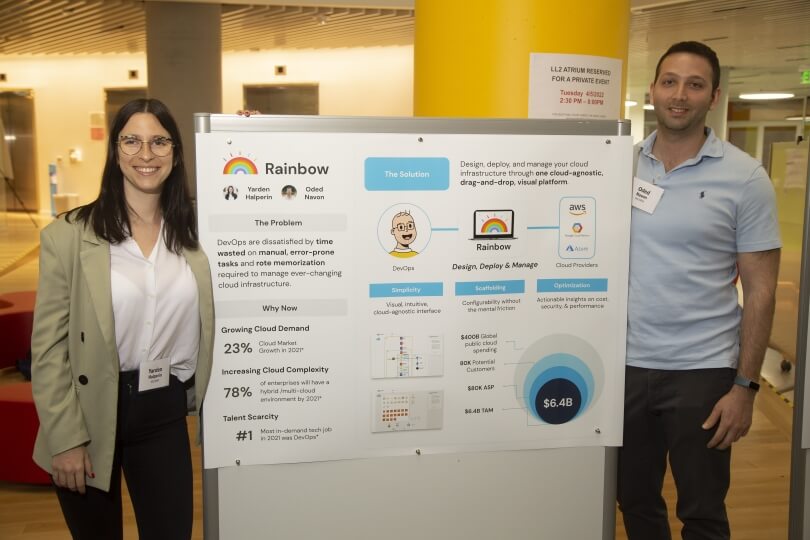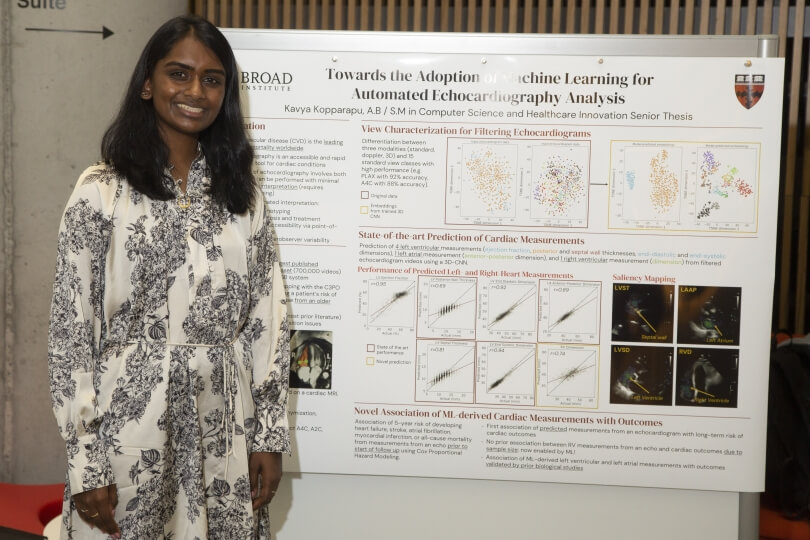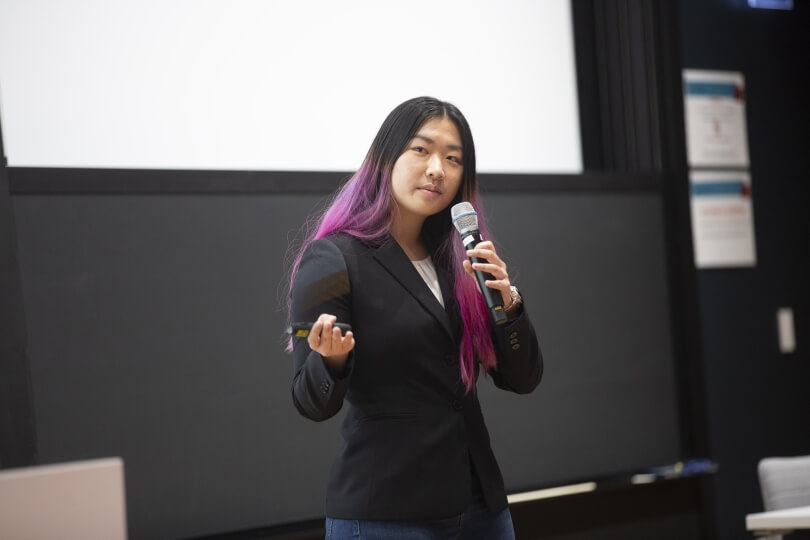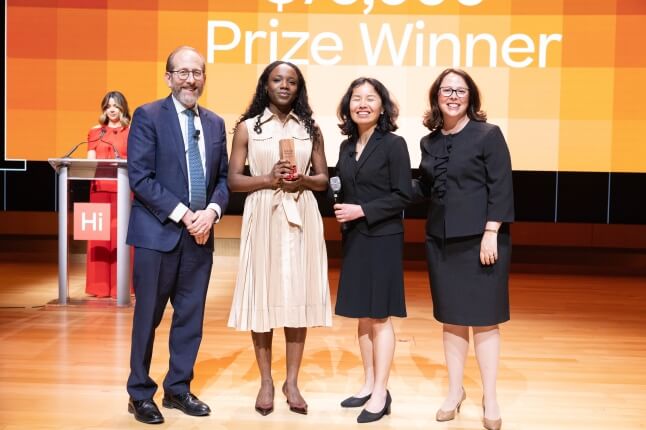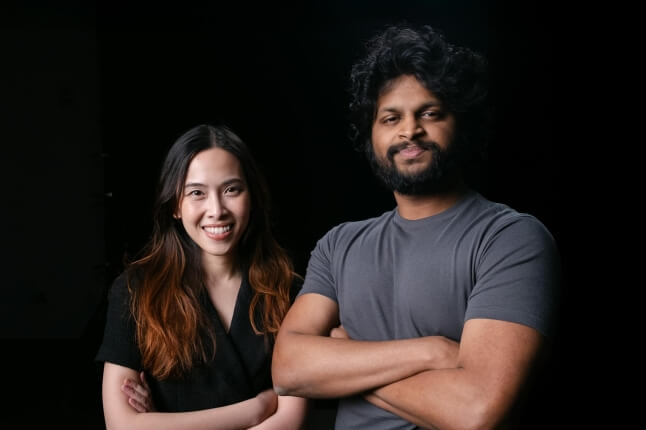News
A way to remove defunct satellites from orbit. An easier way to invest in carbon credits. A video game that incorporates artificial intelligence into every area of gameplay. These are just a few of the entrepreneurial ventures presented at the joint Technology Showcase of the Harvard John A. Paulson School of Engineering and Applied Sciences (SEAS) and the Harvard Business School (HBS) earlier this month.
The presenters included graduate students in the MS/MBA: Engineering Sciences program, as well as undergraduates in the Undergraduate Technology Innovation Fellows Program, supported by the Roberts Family Foundation and co-organized by SEAS, HBS and the Harvard Faculty of Arts and Sciences.
As Roberts Family Fellows, undergraduates can take HBS courses normally available only to graduate students. The Fellows also meet regularly in seminars with Harvard faculty and tech sector alumni. In addition, they partner with MS/MBAs to develop venture concepts in Technology Venture Immersion, an intensive January-term course that culminates in pitches to venture capital investors and seasoned entrepreneurs.
Yarden Halperin, left, and Oded Navon present Rainbow, their cloud infrastructure visual platform, at the SEAS/HBS Technology Showcase at the Science and Engineering Complex in Allston. (Credit: Christopher Burns)
“The MS/MBA is clearly a program for ambitious people,” said Rob Howe, Abbott and James Lawrence Professor of Engineering at SEAS and co-chair of the MS/MBA. “The focus is on training future leaders of tech ventures and new high-tech start-ups. We’re used to having great students, great future technology leaders, in our graduate engineering programs, but the MS/MBA students bring a real-world focus. That brings a whole new level of energy to the place.”
Oded Navon and Yarden Halperin, students in the MS/MBA program, drew on their real-world experiences as they worked on Rainbow, an easy-to-use visual platform for managing and automating cloud-based software and hardware. Before arriving at Harvard, Navon interviewed with a tech company that asked him to complete a task using a cloud computing platform. Despite his previous experience as a software engineer, he found it to be surprisingly difficult.
After meeting Halperin in the MS/MBA program, the two realized this was a challenge for many development and operations workers, and one they wanted to address.
“I found it very enjoyable, doing all the customer discovery, talking to people, learning their pain points and daily issues in their jobs,” Navon said. “Finding that our solution could actually help them was a very nice moment.”
For her project, second-year MS/MBA student Kaylee Carpenter researched improving access to alternative healthcare such as acupuncture. Carpenter’s project was inspired by her own difficulties finding alternative healthcare providers.
“The majority of Americans with chronic disease, which is a lot of us, would benefit from alternative healthcare,” Carpenter said. “So how do we think about people like me, who are pretty wellness-minded but didn’t really give acupuncture a glimpse until I was turning over what felt like the last rock?”
Kavya Koppaparu presents her research on machine learning in echocardiography at the SEAS/HBS Technology Showcase at the Science and Engineering Complex in Allston. (Credit: Christopher Burns)
Senior Kavya Koppaparu, a Roberts Family Fellow, also presented healthcare-related research, but her work was in an entirely different realm than Carpenter. She aggregated approximately 700,000 echocardiographic videos available through Mass General Brigham, and designed an algorithm that could interpret an echocardiogram to determine important diagnostic measurements of the heart in order to plot the risk of cardiac ailments over five years.
“I’ve done a lot of work at the intersection of AI and healthcare, and a driving factor for me has always been accessibility,” she said. “Echocardiography is a very low-cost, minimally invasive task, where it takes very little training to be able to administer it, but a lot to interpret it. This has the potential to be a very important intervention in point-of-care settings.”
Some of the start-ups presented at the showcase offered direct-to-consumer products or services, such as Coolant, Roberts Family Fellow Michael Wu’s carbon credits marketplace, or “Regent,” MS/MBA student Weston Ruths’ AI-driven video game. But others, such as Aaron Sabin’s carbon-capturing Carbon Vacuum start-up, fell under another category: “tough tech,” which refers to technologies expected to have very long product development cycles, uncertain technical feasibility, and unproven market demand.
“It’s really cool if you can take a technology out of a SEAS lab and help an inventor figure out how to commercialize that,” said Tom Eisenmann, Howard H. Stevenson Professor of Business Administration at HBS and co-chair of both the MS/MBA and Undergraduate Technology Innovations Fellows Program. “Every year we’re seeing more and more of that.”
The Undergraduate Technology Innovations Fellows and MS/MBA programs allow students to mesh their entrepreneurial and technical interests in so many diverse ways. While start-ups and research initiatives made up the majority of the showcase, third-year undergraduate fellow Catherine Yeo used what she learned to research and publish a book on the rise of online content creators.
Catherine Yeo addresses the crowd at the SEAS/HBS Technology Showcase at the Science and Engineering Complex in Allston. (Credit: Christopher Burns)
Yeo, who’s concentrating in computer Science at SEAS with a secondary in English, first became interested in the world of start-ups as a high school student selling her art and writing on digital content platforms such as Tumblr.
That interest has stuck with her throughout her years at Harvard, where she’s applying the principles of entrepreneurship to the world of publishing.
“Entrepreneurship is not limited to just one area or one mode of thinking, and that’s what’s been really awesome about the Undergraduate Technology Innovation Fellows program, the MS/MBA program, and the constant interconnected collaboration between the two,” said Yeo. “I was really drawn to the program through this incredible community of peers, all eager to collaborate and drive towards entrepreneurial endeavors and futures. The sheer diverse range of talent, interests, backgrounds and initiatives that everybody brought to the table really excited me.
SEAS/HBS Technology Showcase
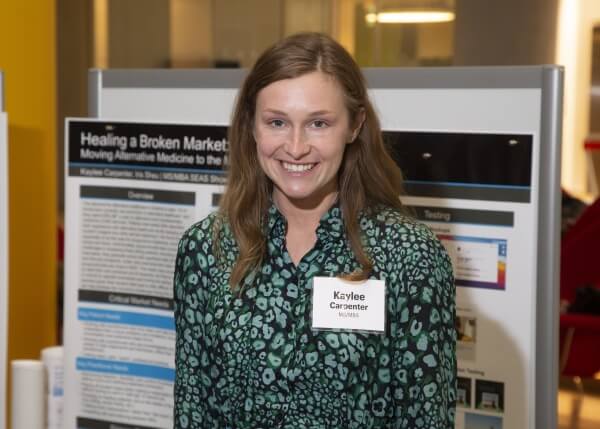
MS/MBA student Kaylee Carpenter presents her research on improving access to alternative healthcare at the SEAS/HBS Technology Showcase at the Science and Engineering Complex in Allston. (Credit: Christopher Burns)
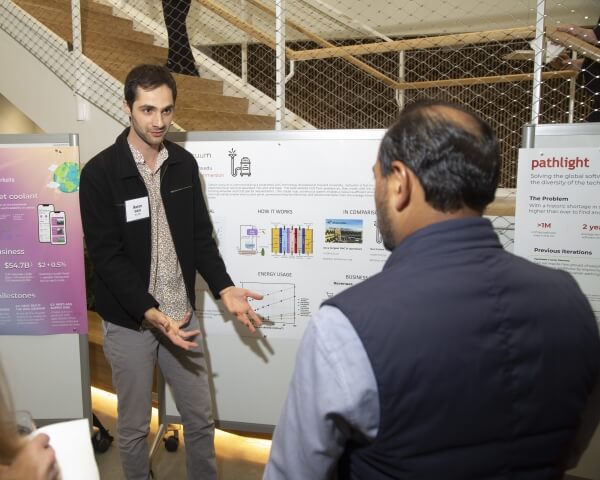
MS/MBA student Aaron Sabin discusses his carbon capture start-up, Carbon Vacuum, at the SEAS/HBS Technology Showcase at the Science and Engineering Complex in Allston. (Credit: Christopher Burns)
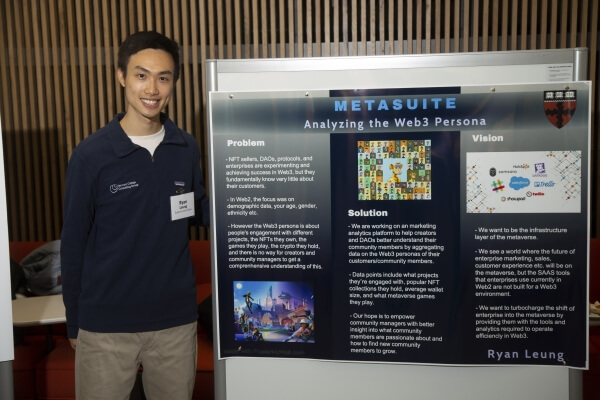
Roberts Family Fellow Ryan Leung presents Metasuite, his marketing analytics platform, at the SEAS/HBS Technology Showcase at the Science and Engineering Complex in Allston. (Credit: Christopher Burns)
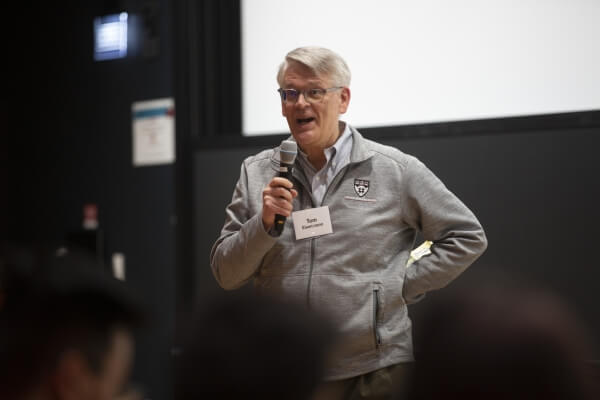
Tom Eisenmann, Howard H. Stevenson Professor of Business Administration at HBS and co-chair of both the MS/MBA and Undergraduate Technology Innovations Fellows Program, addresses the audience at the SEAS/HBS Technology Showcase at the Science and Engineering Complex in Allston. (Credit: Christopher Burns)
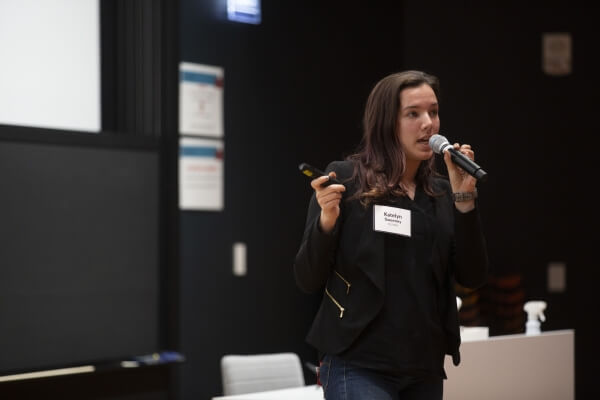
MS/MBA student Katelyn Sweeney discusses Syzygy, a start-up focused on removing defunct satellites from orbit, at the SEAS/HBS Technology Showcase at the Science and Engineering Complex in Allston. (Credit: Christopher Burns)
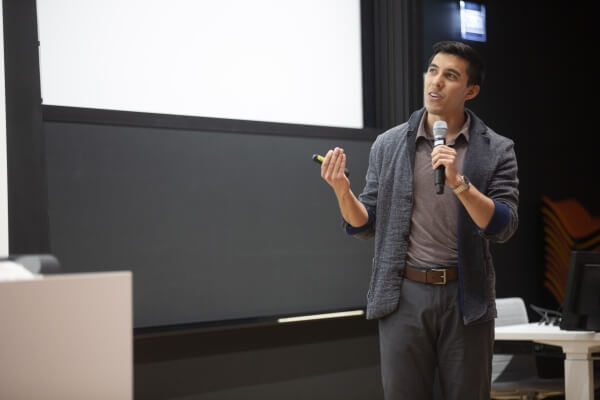
MS/MBA student Weston Ruths shows off Regent, an upcoming video game driven by artificial intelligence, at the SEAS/HBS Technology Showcase at the Science and Engineering Complex in Allston. (Credit: Christopher Burns)
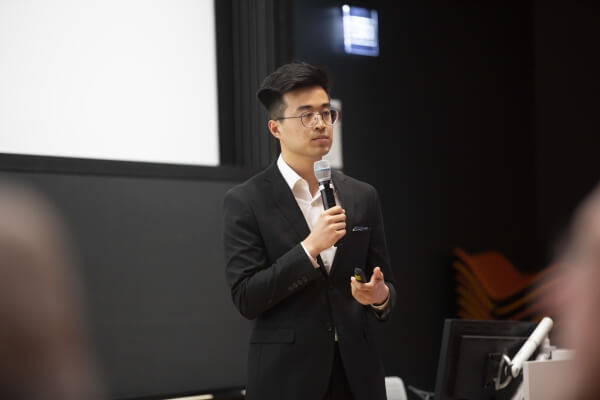
Roberts Family Fellow Michael Wu discuses Coolant, his carbon credits investment app, at the SEAS/HBS Technology Showcase at the Science and Engineering Complex in Allston. (Credit: Christopher Burns)
Topics: Entrepreneurship, MS/MBA
Cutting-edge science delivered direct to your inbox.
Join the Harvard SEAS mailing list.
Press Contact
Matt Goisman | mgoisman@g.harvard.edu
